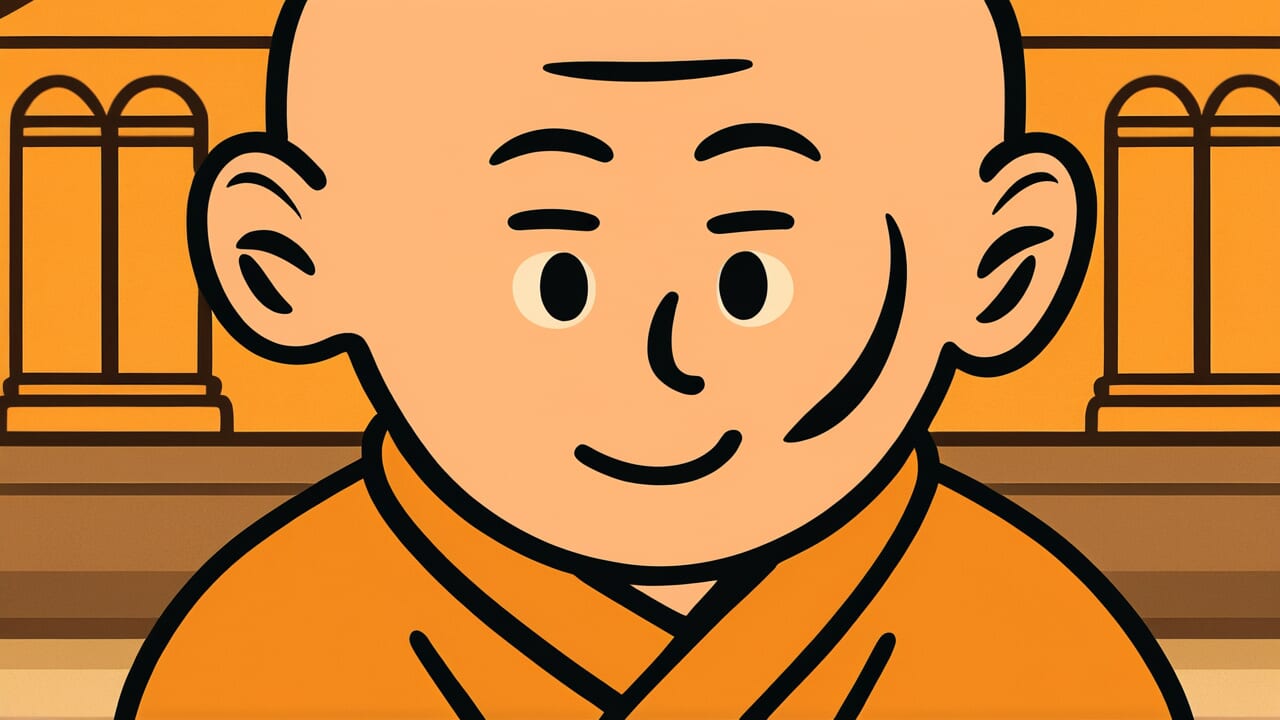How to Read “Once out of the temple, no longer a monk”
Tera kara dereba bōzu
Meaning of “Once out of the temple, no longer a monk”
“Once out of the temple, no longer a monk” means that when you leave a certain place, you lose your position and authority.
A monk who is respected and holds authority inside the temple becomes just an ordinary person once he steps outside.
This proverb shows that a person’s authority and influence depend heavily on their place and position, rather than on their own essential qualities.
Job titles at companies, positions at schools, and ranks in organizations only have meaning within specific places and situations.
This teaching still applies today. A department manager with authority at work is just a father when he returns home.
A student council president with influence at school becomes an ordinary student once outside the school gates.
This proverb teaches us about the fundamental fragility of authority and position, and how they depend on place and situation.
Origin and Etymology
There are no clear records of when this proverb first appeared in literature or where it originated.
However, based on its structure, we can assume it came from observations of monks’ positions in Japanese temple society.
Before the Edo period, temples in Japan were not just religious facilities. They were also symbols of authority in local communities.
Monks gave sermons, performed rituals, and were respected by people within the temple. Wearing magnificent robes and preaching Buddhist teachings in the main hall, they embodied authority itself.
However, the same monk became just another person once he left the temple gate and entered the town.
Even wearing robes, without the temple as a stage, his authority greatly diminished.
People may have shown respect not to the person himself, but to the place called the temple and the role of monk.
This proverb expresses the magnitude of authority that place and position give to people through the easy-to-understand example of temples and monks.
It’s a phrase born from sharp observation that questions what authority is and what position means.
Usage Examples
- The person who acted bossy as a department manager found that once out of the temple, no longer a monk—after retirement, nobody paid attention to him anymore
- Though respected as a teacher at school, once out of the temple, no longer a monk, so I stay humble in my private life
Universal Wisdom
The universal truth shown by “Once out of the temple, no longer a monk” is that much of human authority and influence is actually supported by external factors.
We tend to think a person’s power and dignity come from their own qualities. But in reality, the place they stand, the title they wear, and the organization they represent play major roles.
This insight sharply points to the essence of human society. Because we all live inside some kind of “temple.”
The temple of a company, the temple of a school, the temple of a family. In each place, we play different roles and hold different authority.
But the moment we leave that place, that authority disappears like mist.
This proverb has been passed down for so long because humans are always easily confused by authority and position.
We get distracted by superficial status and titles, losing sight of a person’s true nature. Or we get drunk on the position we’re given, mistakenly thinking it will last forever.
Our ancestors saw through this human weakness.
At the same time, this proverb contains hope. If authority depends on place, it also means anyone can shine when they find the right place.
When AI Hears This
A monk inside a temple is “background,” but one step outside the temple, he becomes “a person with the characteristic of being a monk.”
This change has the same structure as the observer effect in quantum mechanics.
In the quantum world, an electron isn’t “here” or “there” until it’s observed. The act of observation is what determines the electron’s position for the first time.
In other words, the framework of observation determines the nature of the object.
The same applies to monks. Within the context of a temple, a monk is “a naturally present existence” that blends into the background and holds no special meaning.
But the moment he moves to a different context—the street—the same person is observed as an existence with the distinctive characteristic of being “a monk.”
The person himself hasn’t changed at all, yet his meaning fundamentally changes because the observer’s context has changed.
This shows that our perception captures not the object itself, but “the relationship between object and context.”
Quantum mechanics teaches us that objective reality independent of the observer may not exist. This proverb teaches us that the same thing happens at the everyday level.
What we see is not “things themselves” but always “things within context.”
Lessons for Today
What this proverb teaches modern people is the importance of humility.
The authority and influence you have now are not yours alone. They’re given to you by the place you stand, the organization you belong to, and the role you carry.
Understanding this fact frees us from unnecessary arrogance.
At the same time, this proverb teaches the importance of developing real ability. Build your own value that doesn’t depend on place or position.
Specialized knowledge, personal charm, sincere character—these stay with you no matter what “temple” you leave.
Your perspective on evaluating others will also change. You can develop the ability to see the person themselves without being confused by titles and positions.
If you realize that the authority of someone acting important might just be borrowed, you won’t shrink unnecessarily.
Life has various “temples,” and we repeatedly enter and exit them. What matters is having a core self that doesn’t change no matter where you are.
And while being grateful for the role given to you in your current place, don’t drown in it.



Comments